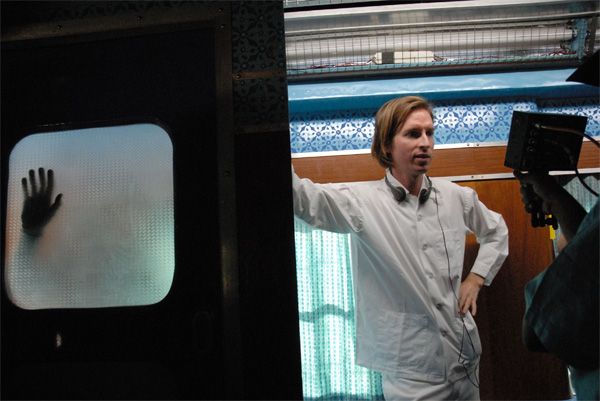I absolutely loved director Wes Anderson's Fantastic Mr. Fox. The film is his first foray into stop-motion animation and it's like he brought the genre to him rather than attempting to adapt to the genre. Trust me; if you're a fan of his previous work like Rushmore, The Royal Tenenbaums, and The Life Aquatic with Steve Zissou, you're going to love this movie.
As most of you know, Fantastic Mr. Fox is based on the best-selling children's book by Roald Dahl (Charlie and the Chocolate Factory, James and the Giant Peach) and it features the voices of George Clooney, Meryl Streep, Jason Schwartzman, Bill Murray, Wally Wolodarsky, Eric Anderson, Michael Gambon, Willem Dafoe, and Owen Wilson. But unlike some animated movies that cast famous actors to help sell tickets, everyone who provides a voice is perfect in this film. Again, this is a great movie that you should check out this weekend.
To promote the film, I recently participated in a group interview with the talented filmmaker. We talked about how the project came together, stop motion animation, voice casting, future projects, and a lot more. It's a great conversation worth checking out. As always, you can either read or listen to it after the jump:
The transcript is below, or listen to the audio by clicking here. Fantastic Mr. Fox is now in theaters.
Question: How long before this Mr. Fox figure is on Sideshow Collectibles?
Wes Anderson: I think never. Because there aren't that many of them and these things cost a fortune.
How much?
Anderson: I actually don't know how we calculate it because there's not that many of them that are made in the first place but there's so much time that goes into designing them and testing them and all that stuff. Normally somehow that gets absorbed into how they calculate cost. A prototype is always more expensive than anything. These are all sort of prototypes I guess. The face, for instance, is filled with all these little metal palates and things that can move, be positioned and stay in place. It's more complicated than it looks. I don't mean to brag about the puppet.
So you manipulate the faces. The Nick Park technique is to just put on different faces.
Anderson: Yeah, and theirs are plasticine. Most of their puppets or maybe all of them. Most of their puppets. The Were-rabbit I think is maybe a different kind of puppet. Yeah, they do a lot of mouth and eye removals and whole face replacement. We have a little bit of that kind of stuff. We had some eyes that we switch out and some teeth that we switched out but this is a different kind. This is more in the vein of Corpse Bride although it's different materials but it's the same sort of thing where there's a skeleton with joints and the plasticine is completely adjustable. Plus they used replacement heads and parts of faces and things like that.
It's a cliché at this point, but how did you make Mr. Fox work for kids and parents?
Anderson: Well, that's good to hear. Our approach as writers, I wrote it with Noah Baumach. For me it was always a children's film. It's based on a children's book, a book I loved as a child. It's talking animals. It's just basically a children's film and as a rating that it has to be kept within. But other than thinking of it that way at the beginning, I don't really think we ever particularly thought of it that way as we went along. We just tried to do whatever we liked, whatever we thought would make the best movie in general. So I think it wasn't directed exactly at children. We were just trying to make it seem like Roald Dahl. We were trying to imagine what Roald Dahl might have, how he might have done it. So it's our version of that I guess.
What would he have thought about jokes about mortgages and pregnancies?
Anderson: I can't guess what he would say. One thing is ours is American in the end. It's supposed to be set in England and we're kind of thinking of England, but it's still written by two Americans and I think we sound American and that's why we cast. Most, all the animals are played by Americans so there's something basically different from Dahl in that. But, I think he didn't write down to children. He sort of used his whole imagination and I don't know what he would have thought, but I know his family feels like he would have approved. His wife does but obviously no one can really guess what he would have thought himself.
How hard was it to keep the spirit of your other films and not subscribe to the animated formula?
Anderson: I don't think I made any effort to make it like my other movies or to make it even mine. My only effort was one, to try to make it seem to me like Roald Dahl and then to make it as fun and energetic and interesting as it could be. Really it was as simple as that. I don't think I ever make choices trying to bring it closer to me. I just make choices to try to make it better but it ends up being my version of what I think is better and that ends up connecting to other...
You chose retro animation, instead of going forward.
Anderson: Yeah, that was right at the beginning. I've always loved stop motion animation and I particularly wanted to do stop motion with puppets that have fur, for whatever reason that is. I've always liked that. Some of the stop motion I've always liked, I like the Harryhausen movies and I like the holiday specials that are on TV by the Rankin Bass company and those are kind of a bit primitive stop motion.
Dealing with animation, do you have to think that this could become a perennial and play in houses forever?
Anderson: That's the kind of thing you hope can happen but it's not really something that is occurring to me while we're making the film. The process of making the movie, like other movies, is how are we going to address this problem and how can we make this part better and do we have any new ideas for this one here. It's always just sort of step by step and it's rarely about - - I find myself often saying, "Are people going to understand this? Is this clear?" Not so much, "Will this group of people like it versus this group?"
Why did you make your Mr. Fox more flawed than the book?
Anderson: Well, I felt like in the book he was not ideal because he was the one who got them in trouble in the first place. In the book, he's a bit vain and he gets in trouble with his community. They're angry at him because he's causing the problem. We expanded on that. I think he's maybe more flawed in the movie than he is in the book.
What about as a father? There's only Ash instead of four kids.
Anderson: In the book, they don't really have individual identities, his children, and we made a story of his son, his visiting cousin. That was partly, I guess we just felt like for a movie it was better, rather than having this whole group to just focus on one personality and to develop a story for him. But it does end up being, that just adds to him being more flawed.
You and Noah can't get away from fathers and sons. Does working with stop motion fantasy allow you to explore that in a different way?
Anderson: Yeah. Some of that kind of stuff, it's a bit unconscious and then afterwards I say, "Gosh, this is like Gene Hackman." But then on the other hand, in this one, we didn't just look to the book as our inspiration. We also looked to Roald Dahl himself. We got a lot from that. Dahl is a kind of incredible figure but complicated. There are definitely layers to this guy's personality. He's sort of a fascinating person and we tried to weave in different aspects of him. I don't know, there are some ways that are specific like we modeled the whole movie on his house and the area around it and things like that and used objects and things. There's physical stuff and we also modeled one of the characters' faces partly on Dahl. Then also just some aspects of his personality that we were aware of that I don't know how they worked their way in, but we felt like they were getting into it.
Tell us about visiting Dahl's house. Was it strange?
Anderson: No, very, great. It's a wonderful place. From when I first went there, I've been there many times over the years because the movie has been 10 years from when I first approached the Dahl estate until making the film. But, you can see his hand at work at this house. There's a gypsy caravan in the back that he bought from a family of gypsies that were traveling through there. He bought their caravan and that's there. We in fact modeled some bunk beds in the movie on this gypsy caravan. The room where he wrote is kind of carefully modified just how he wanted it. He wrote not on a desk but a roll of cardboard that's taped up that went across his lap with a board with pool table felt on it that leaned across it with his shape cut in it, and a suitcase full of bricks on the floor with a board nailed to keep it from sliding for his feet, and an electric heater that's mounted on two kind of untwisted coat hangers that he could slide forward and back to control the level of heat. It's all sort of jerry rigged the way he wanted it. There's things like that all through the place. There's a real personality there.
Did cuss come from the books?
Anderson: No, that was our thing.
What did you achieve with that?
Anderson: Achieved might be too strong a word.
I'm thinking way too hard about the questions.
Anderson: That's okay. The cuss thing was as simple as it's a PG and probably, I don't remember the exact moment of coming up with that, but I feel like we were in Los Angeles. At the very beginning of talking about writing this, we were here and kind of came up with that thing and it was probably that we had some line that we couldn't say. We said, "How can we? This is funny this way. How can we do this?" Then it just started to expand from there. At a certain point in the process, there was probably twice as much cuss-ing in it as there is in the end.
To me it reminded me of frak but so much cuter.
Anderson: What is Frak from?
BSG
Anderson: From Battlestar Galactica, oh my gosh, yeah. We may have been inspired by that. We certainly grew up with that show. Didn't he have a dog? Is there a dog in Battlestar Galactica, like a robot dog?
On a live-action movie, you get 5 pages on a good day. How does it affect your work to get five seconds a day?
Anderson: The thing with this kind of movie is with a live action movie, we've got to do X number of shots in a day sequentially until let's say the sun goes down, if that's the kind of day it is. So you're in a race through the day one thing, and as soon as you finish it, you're already trying to get the next thing started. With this, you're doing instead, say, 27 things all at once. You have different units and you've got 11 Mr. Foxes working and you've got six of his sons and each unit has a different animator. There are three main directors of photography but other guys too and there's a lot of people. Everything is moving very, very, very slowly on each set. Plus, there's the production designer and his team who are working on lots of stuff that's coming up and the puppets department that during most of the movie are preparing puppets that have not started shooting yet, puppets that we're still designing and testing. And the editorial team that's with me and we're making storyboards and editing the dialogue, so the process is instead bouncing back and forth from one thing to another all through the day as we move a tiny bit at a time. At the end of the day, I get these dailies that are all the shots, each shot with all the work that's gone on the shot plus the new stuff of the day. So the process ends up being you watch each shot and at the very end of the shot, you say, "Okay, let's see what happened here. That's the new part." You see how it went and hopefully it went well. Then I talk to the animators and we kind of discuss anything.
Is there another book you think could be done in this style, or is this a one off for you?
Anderson: Well, I really liked working in this. It took a long time for us to figure out a sort of system that was where I was happy working on it. It took a lot of effort to figure out a way for me to feel like I could be involved to the degree that I wanted to be involved because at a certain point, I thought I was going to prepare everything and prepare this script and the voices and design, test the shots and things. Then I'd hand it over to be animated and that's nothing like what ended up happening. It was clear pretty early on that I was going to have to make it my whole - - I thought I might be able to direct another movie while it was being animated. It wasn't like that at all. It became, a movie like this just takes over every minute of your life for this period of time and you're just in every little tiny bit of it. There's just too many decisions to be made. But, once we sort of got a way to do it, a way to communicate and watch all these things at once, I really enjoyed it and felt I had a way of doing it I felt suited to and I was having fun. So I would like to do another one. I don't think my next movie is going to be animated but I would like to do something where we could go outside and there are living people standing in front of the camera. But, I do want to do another one.
Did you hear the actors' voices as you wrote?
Anderson: It wasn't during the writing. During the writing, I think we just thought of animals. We never really discussed casting. As soon as it was finished and Clooney came up right off the bat, that was sort of the first thing because I've always liked him and I think he seems as heroic as any actor I can think of. And, I sort of realized as we went along, he has a wonderful voice and brings so much to his performance just through his voice.
You said you might do a sci-fi film. Were you serious?
Anderson: There's been a whole bunch of talk online about that?
Shooting on the moon. Any truth?
Anderson: I think that was a joke I made outside the premiere the other night. I wasn't aware that that anybody thought I really meant it. I said I wanted to shoot on location in space. After I said it, I did think that might be nice. I don't know, I'm not sure. That's kind of a James Cameron type move I think.
Is sci-fi something you're interested in? Your style would be interesting in a different genre.
Anderson: I would like to do a movie in space, but I think it would be difficult to do it on location. I mean, somebody's going to do that before too long I suppose. The thing is probably right now to do it, you'd probably have to submit the script to NASA. You would be dealing with, you'd get notes from government officials.
Like Michael Bay.
Anderson: Does he? Really? You mean if he wants these jets, he can't make it seem like - - he's got to be clear that it's pilot error and not the machinery or something like that.
So you wouldn't settle for visual effects space?
Anderson: Well, I probably would have to at a certain point.
What kind of story are you thinking?
Anderson: I'm not at liberty to discuss that now
After casting the leads, you went to your repertory company. Do they all say yes when you call? What does it do for you as an artist to have this team?
Anderson: Well, the guys who are my friends tend to say yes right off the bat but on other films, you start with the cast, you have a cast in mind and quickly you're dealing with the realities. Who actually wants to do it and who's available to do it and whatever problems are coming up? But in the case of this movie by the way, we did get it. George Clooney and Meryl Streep were both enthusiastic and that was just great luck that they seemed to read this and think, "Oh yeah, I like this." Because you can't predict somebody's reaction to something like that. But I really like working with friends and I kind of feel like George Clooney became, he was so open to however we wanted to do it and made himself available. We recorded on a farm in Connecticut and it was through friends of his who are also friends with my brother, they have mutual family of family friends who have this farm in Connecticut. That's where we went and did all our initial recordings and it was like going to camp with George Clooney and Bill Murray and all these characters.
Have you announced your next project?
Anderson: No.
Do you know?
Anderson: I'm writing something but it's so early to - - I don't think I could even accurately describe it.
Is there a father and son?
Anderson: Mm, not really.
Directing Clooney and Streep to make eating and digging noises?
Anderson: That's something where they're both actors where you feel comfortable saying, "Can you eat in a more growly way?" And they go, "Oh, you mean like this?" And they'll try it. I don't know if Gene Hackman would be wildly enthusiastic to do that, although I will say he would probably do it very well.
Did you actually record together?
Anderson: I don't know exactly how it's done in most animated movies. I hear that everybody's sort of recorded individually but then I wouldn't be surprised if the guys from Pixar read that and say, "That's not how we do it. We bring them together." But I do think that it's usually, almost always, maybe kind of always done in a recording studio and pretty separate and doing it sort of documentary style is a bit different for us, but also the Aardman Creature Comforts films are sort of modeled on this idea. They're interviews, live interviews with people on the street that they've then animated. That's kind of an inspiration for this method of recording these.
And the song?
Anderson: That was working with Alexandre Desplat our composer. I said, "You know," it was literally this. "Okay, so I'm going to come back on Tuesday. Oh, by the way, see if there's like a tune for this farmer's song. These are the words here." Ba ba ba ba bum and he hummed it immediately using a theme he'd already written for the farmers, and within 20 seconds he had the song and that was that. Which I will say is exciting if you have somebody who's that kind of talented and versatile who can just adapt the thing you're talking about immediately. The next thing we knew we were kind of expanding it into this whole song for this showdown scene.
Do you just have a list of songs at home for future projects?
Anderson: Well, sometimes I have some music set aside. For instance, in general, I wouldn't say I have that and for Fantastic Mr. Fox I didn't have that, but for the next thing I'm working on I do have a bunch of music that's set aside for it. Then also, the song at the end of Fantastic Mr. Fox is called Let Her Dance by Bobby Fuller Four. That's something that Randall Poster, my music supervisor and I, have had set aside for many years with the idea we're going to find a place for this. Then we kind of figured it out.
What song is on tap for the next one?
Anderson: That one, it's not exactly songs. I'll just leave it at that.


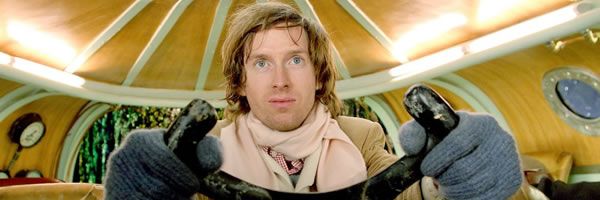
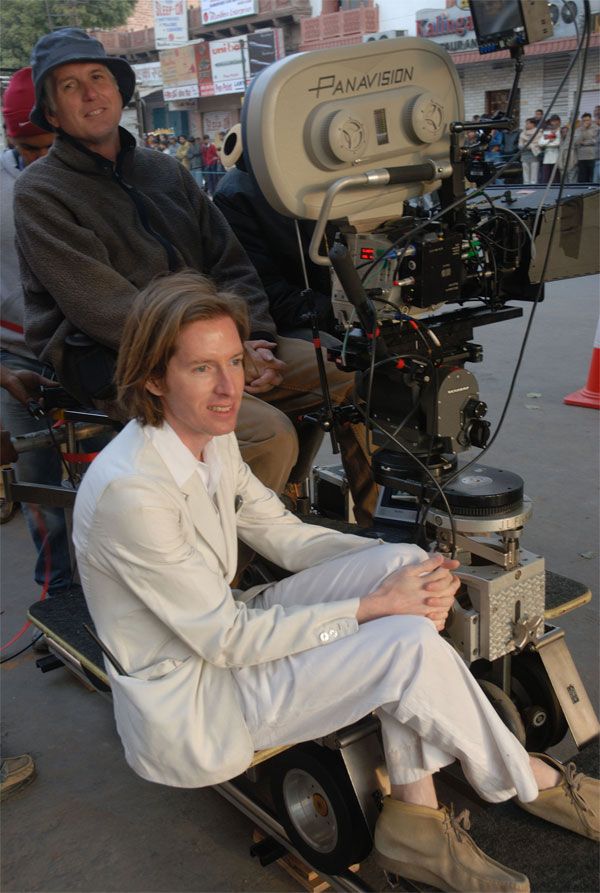
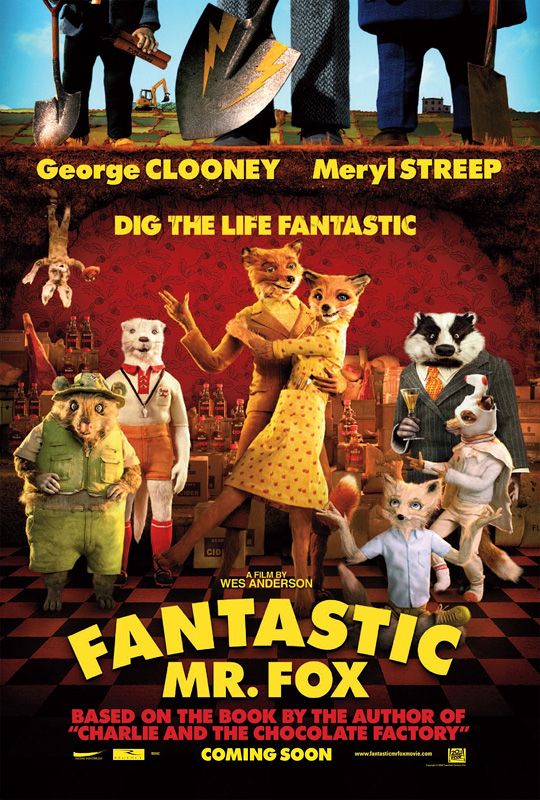
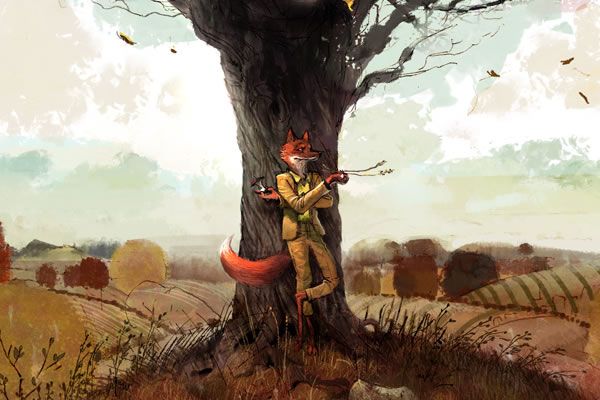
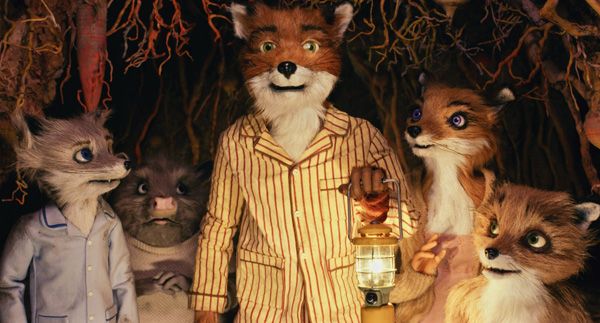
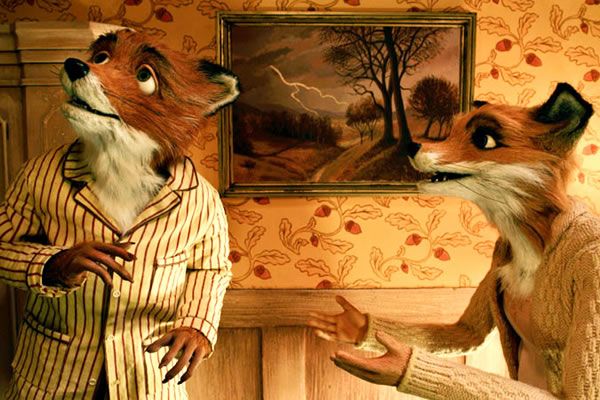
.jpg)
